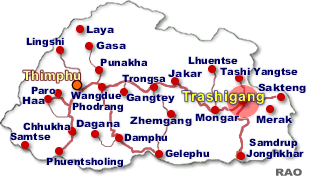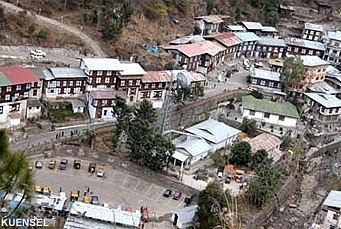 |
Bhutan's
Festivals Tshechu |
|
 |
Bhutan Information |
|
|
 |
|
Trashigang:
Kholong Tsechu
|

|
 |
| For
the people of Trashigang, who are yet to come off the festive hangover
of Trashigang tshechu, that ended three days ago, it is time to attend
yet another tshechu, the Kholong tshechu, which began in Yonphu, Kanglung
gewog, on November 23.
This
tshechu draws a lot of attention from people, not because it is one of
the oldest in the east, but because of its name. Kholong, a literal translation
from Sharchopkha, means a 'fight'. So a precise interpretation would be
the "fighting tshechu". |
|
| The
only fights here are of good against evil |
 |
As
such it is not surprising to find people wondering if there are going to
be fight competitions during the tshechu.
 |
Trashigang Town
| While
there is no such competition, a Sherubtse graduate participating in the political process remembers seeing a group
of brokpas exchanging
blows after emptying a couple of ara bottles some ten years ago when he
was in college, situated about seven kilometres from Yonphu.
Mem
Sangay from Pangthang said, when he was young, he witnessed army personnel
from Yonphula involved in a brawl with some mask dancers during the tshechu.
It's no exaggeration, but another Sherubtse graduate, now a father of three,
said he split with his girl-friend, following a row at the tshechu, which
they had attended together eleven years ago. |
|
It's
no exaggeration, but another Sherubtse graduate, now a father of three,
said he split with his girl-friend, following a row at the tshechu, which
they had attended together eleven years ago.
Village
elders, Kuensel spoke to, say that everything is a mere coincidence and
addressing it as Kholong tsechu was derogatory.
The
name supposedly popped up some twenty years ago when there had been fights
on a few occasions.
"Now
it has become so popular that many think it's the original name," said
the Kanglung gup Ugyen Dorji, who claims to have seen not a single fight
during his tenure as gup in the last nine years.
He
said that the tsechu was almost 400 years old and one of the oldest in
the east.
It
was actually called Yonphu tsechu and had originated from the name of the
place, Yonphuel Ugyen Choling. This was where Terton Pema Lingpa's son,
Sangla, had resided. He had initially arrived to bless the people there.
Having no money to offer, local people had offered him their land, where
a lhakhang was built.
The
tsechu was also considered unique for its mask dances like Peling Ngacham,
Saduel Phagcham, Sangling Ngacham, Homcham, Drelcham, and Gingcham initiated
by Terton Pema Lingpa and his descendants.
The
tsechu was performed every year with contributions, both in cash and kind,
from people in the gewog.
"It's
very sacred and nowhere in the text is it written that it should be called
Kholong tsechu. It is misleading people," said the gup, adding that similar
fights arose during tsechus in other places, but nobody thought of changing
their names. Sale of alcohol was banned and game stalls were prohibited
to avoid unnecessary nuisance.
A
veteran mask dancer for the last 32 years, Cheten Wangchuk, said that they
were making the utmost effort to preserve the originality of the dances,
which was not easy owing to new performers every year, and such disparaging
terms ignited very negative connotations. "It's not a place to fight. And
it's certainly not a good term for such an auspicious occasion,' he said
 |
| By
Kesang Dema, KUENSEL, Bhutan's National Newspaper 2007 |
| Information on Bhutan |
 |
|




